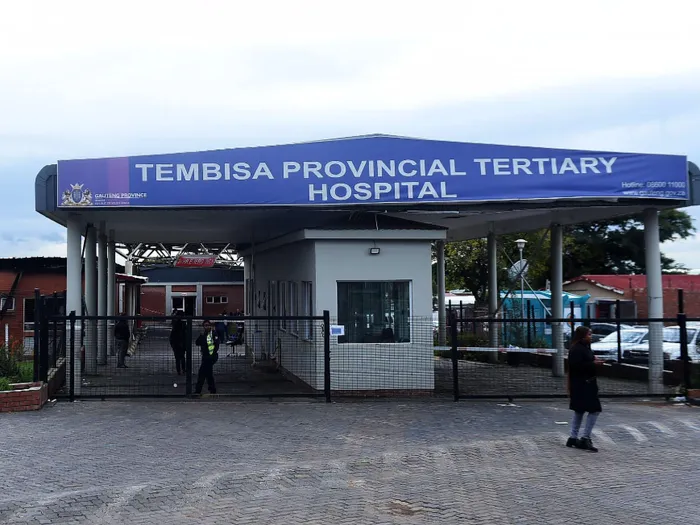
Unions that represent nurses and medical workers have called for tougher action to be taken against syndicates and departmental officials linked to the R2 billion Tembisa Hospital corruption.
Image: Itumeleng English / Independent Newspapers
TRADE unions representing medical workers and nurses believe low-level workers could have been exploited and manipulated into enabling fraud and corruption syndicates to loot more than R2 billion from Tembisa Hospital.
“It must not be that low-level employees are used by criminal syndicates and then they are protected. We must expose the extent of this rot at all levels because we believe that low-level workers could have been exploited and manipulated.
"These syndicates should never be protected as they used workers to gain access to the R2 billion worth of corrupt contracts at Tembisa Hospital. The Department of Health must conduct a thorough investigation to get to the bottom of this corruption," said National Education, Health and Allied Workers Union (Nehawu) Gauteng provincial secretary, Mzikayise Tshontshi.
His remarks follow after the Special Investigating Unit (SIU) interim report found that R2 billion was looted from the hospital through the manipulation of procurement processes.
The report identified three main syndicates operating at the hospital. The Maumela syndicate is linked to Hangwani Maumela (the nephew of President Cyril Ramaphosa through a previous marriage) and the Mazibuko syndicate is linked to Rudolph Mazibuko, while investigations are continuing into X syndicate.
Last week, SIU head Andy Mothibi said that at least 13 current and former Gauteng Department of Health and Tembisa Hospital employees, ranging from entry-level clerks to managers, were involved in receiving more than R122 million in corrupt payments.
Mothibi had said that the SIU has prepared more than 116 disciplinary referrals after the Office of the Premier referred matters to the SIU to be investigated.
Speaking during a picket outside Tembisa Hospital on Tuesday, Phillip Vilakazi, who joined Cosatu's members as part of the union's International Day for Decent Work, said union members should always conduct themselves ethically to avoid being linked to corruption.
"We are saying heads must roll. It is our responsibility to root out corruption as public servants. We cannot allow a situation where the resources of the state are in the hands of a few people, at the expense of the poor, by those who want to enrich themselves.
"Those involved in corruption must be arrested, and the money they have taken illegally must be paid back. We are saying members of unions must remain ethical and must respect the public. Those who have contractual obligations must not be corrupt, and anyone corrupt must be held to account," he stated.
Speaking on behalf of the Public Servants Association of South Africa (PSASA), Claude Naiker said the union is aware that vulnerable workers were manipulated by officials linked to known syndicates.
"The PSASA is fully aware of the investigation into the Tembisa Hospital scandal, fraud, maladministration, and corruption. We are also fully aware that employees were forced and could have been exploited by syndicates committing fraud to actually perpetuate and commit crime as far as the procurement processes.
"The junior staff were exploited. We have always advocated that employees should not adhere to unlawful instructions because they are victimised and made scapegoats for crimes that they did not initiate," said Naiker.
Last week, Gauteng Health MEC Nomantu Nkomo-Ralehoko disclosed that her department has acted against some of the officials linked to the corruption at the hospital.
"This administration has been at work to ensure that remedial actions in relation to allegations of corruption at Tembisa hospital are fast-tracked and governance systems and controls are strengthened. At that time, there were 11 officials identified in the SIU report who were recommended for disciplinary action and criminal charges, with the criminal element still under investigation based on the second proclamation expanding the scope of the SIU work.
"Eventually five Supply Chain Management employees, who served as Quotation Adjudication Committee members faced various charges based on their roles," she said.
Cape Times